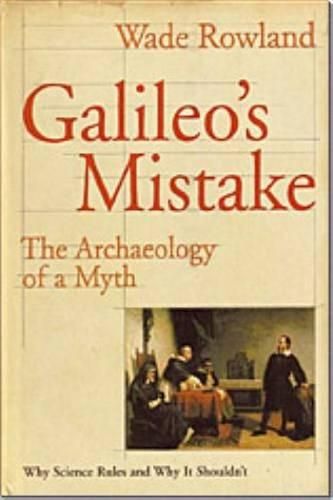Readings Newsletter
Become a Readings Member to make your shopping experience even easier.
Sign in or sign up for free!
You’re not far away from qualifying for FREE standard shipping within Australia
You’ve qualified for FREE standard shipping within Australia
The cart is loading…






Veteran literary journalist Wade Rowland takes one of the modern world’s most influential myths - the epic confrontation of physicist and astronomer Galileo Galilei (1564 - 1642) with the Church of Rome - and turns it on its head. Rowland argues that at the dawning of the Scientific Revolution in the early 1600s, Galileo’s mistake was to insist that science provides truth about nature. The Church fought back against this challenge to its authority by declaring that science provides only models for reality and that the ultimate truth is accessible only through metaphysical or spiritual insight.
Although the 1633 trial centred on Galileo’s telescopic observations of the night sky, Rowland argues persuasively that this was merely the public face put on a much more profound issue: what is truth and how can we know it? Galileo’s ultimate recantation, Rowland argues, must be understood in this light. Couched in the engaging style of travel narrative, this provocative reexamination deconstructs the myth that Galileo was a freethinker waging war against reactionary and anti-intellectual Church.
Using the Socratic method of examining arguments, Galileo’s Mistake moves seamlessly through Galileo’s life and his ideas about the nature of reality. By no means an apologist for the Church, Rowland skillfully and persuasively identifies the source of the ontological crisis that plagues us today: the unquestioned authority of science in determining the nature of reality.
$9.00 standard shipping within Australia
FREE standard shipping within Australia for orders over $100.00
Express & International shipping calculated at checkout
Veteran literary journalist Wade Rowland takes one of the modern world’s most influential myths - the epic confrontation of physicist and astronomer Galileo Galilei (1564 - 1642) with the Church of Rome - and turns it on its head. Rowland argues that at the dawning of the Scientific Revolution in the early 1600s, Galileo’s mistake was to insist that science provides truth about nature. The Church fought back against this challenge to its authority by declaring that science provides only models for reality and that the ultimate truth is accessible only through metaphysical or spiritual insight.
Although the 1633 trial centred on Galileo’s telescopic observations of the night sky, Rowland argues persuasively that this was merely the public face put on a much more profound issue: what is truth and how can we know it? Galileo’s ultimate recantation, Rowland argues, must be understood in this light. Couched in the engaging style of travel narrative, this provocative reexamination deconstructs the myth that Galileo was a freethinker waging war against reactionary and anti-intellectual Church.
Using the Socratic method of examining arguments, Galileo’s Mistake moves seamlessly through Galileo’s life and his ideas about the nature of reality. By no means an apologist for the Church, Rowland skillfully and persuasively identifies the source of the ontological crisis that plagues us today: the unquestioned authority of science in determining the nature of reality.